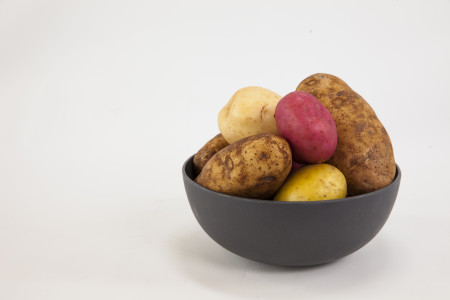NEW STUDY FINDS POTATOES, WHEN PART OF A HEALTHY DIET, NOT ASSOCIATED WITH ELEVATED HEART HEALTH RISK FACTORS AMONG ADOLESCENT GIRLS

Adolescence is a critical period for the evolution of cardiometabolic risk factors that are largely influenced by diet and lifestyle. Understanding these risk factors is essential to developing effective dietary guidance for disease prevention targeting this critical age period. Recently published research in the British Journal of Nutrition found that 9-17 year-old girls who consumed up to one cup of potatoes daily had no increased risk of becoming overweight or developing high blood pressure, dyslipidemia, or impaired fasting glucose by the end of the study in late adolescence.
According to the 2020-2025 Dietary Guidelines for Americans, girls aged 9 - 18 are encouraged to consume 1½ to 3-cup equivalents per day of vegetables, depending on their calorie needs, but most fail to meet these guidelines. In this study, the highest levels of potato consumption ranged from 1/5 to 1 cup per day and at that level, no adverse effects were observed.
“Our results show that nutrient-rich potatoes can be part of a healthy diet in young girls during this important period of growth and development,” says Lynn L. Moore, DSc, MPH, Boston University, the study’s senior author. “There is growing evidence that overall diet quality is what really matters in the preservation of heart health. Potatoes are an affordable food, with a number of valuable nutrients, and our research suggests that moderate intakes of potatoes, along with many other types of vegetables, can be a regular part of a healthy diet pattern.”
Higher intakes of all forms of potatoes (including fried) during the ‘tween’ years of nine to 11 were associated with higher intakes of potassium and dietary fiber, two nutrients of public health concern, as well as vitamin C, vitamin B6 and magnesium. Black girls in this study with the highest intakes of potatoes also consumed more fruit and non-starchy vegetables and had higher diet-quality scores.
Posted:
Friday, 29 October 2021Spud Topics Issues 2024
- June 28, 2024 (0)
- June 21, 2024 (0)
- June 14, 2024 (0)
- June 7, 2024 (1)
- May 24, 2024 (3)
- May 17, 2024 (3)
- May 10, 2024 (3)
- May 3, 2024 (4)
- April 26, 2024 (5)
- April 19, 2024 (8)
- April 12, 2024 (13)
- April 5, 2024 (11)
- March 29, 2024 (11)
- March 22, 2024 (12)
- March 15, 2024 (11)
- March 8, 2024 (8)
- March 1, 2024 (5)
- February 23, 2024 (6)
- February 16, 2024 (9)
- February 9, 2024 (11)
- February 2, 2024 (11)
- January 26, 2024 (11)
- January 19, 2024 (12)
- January 12, 2024 (10)
- January 5, 2024 (8)
Spud Topics Issues 2022
- December 30, 2022 (9)
- December 23 2022 (13)
- December 16, 2022 (8)
- December 9, 2022 (5)
- December 2 2022 (3)
- November 25, 2022 (6)
- November 18, 2022 (7)
- November 11, 2022 (2)
- November 4, 2022 (5)
- October 28, 2022 (5)
- October 21, 2022 (8)
- October 14, 2022 (5)
- October 7, 2022 (6)
- September 30, 2022 (4)
- September 23, 2022 (1)
- September 16, 2022 (3)
- September 9, 2022 (4)
- September 2, 2022 (3)
- August 26, 2022 (5)
- August 19, 2022 (6)
- August 12, 2022 (3)
- August 5, 2022 (4)
- July 29, 2022 (2)
- July 22, 2022 (5)
- July 15, 2022 (7)
- July 8, 2022 (3)
- July 1, 2022 (4)
- June 24, 2022 (9)
- June 17, 2022 (7)
- June 10, 2022 (10)
- June 3, 2022 (7)
- May 27, 2022 (10)
- May 20, 2022 (7)
- May 13, 2022 (5)
- May 6, 2022 (8)
- April 29, 2022 (8)
- April 22, 2022 (5)
- April 15, 2022 (7)
- February 18, 2022 (7)
- February 11, 2022 (6)
- February 4, 2022 (6)
- January 28, 2022 (5)
- January 21, 2022 (7)
- January 14, 2022 (7)
Spud Topics Issues 2023
- December 9, 2023 (1)
- November 22, 2023 (6)
- November 15, 2023 (1)
- November 7, 2023 (1)
- December 29, 2023 (8)
- December 22, 2023 (12)
- December 15, 2023 (7)
- December 8, 2023 (7)
- December 1, 2023 (12)
- November 24, 2023 (0)
- November 17, 2023 (9)
- November 10, 2023 (10)
- November 3, 2023 (16)
- October 27, 2023 (11)
- October 20, 2023 (10)
- October 13, 2023 (13)
- October 6, 2023 (8)
- September 29, 2023 (4)
- September 22, 2023 (4)
- September 15, 2023 (3)
- September 8, 2023 (1)
- September 1, 2023 (0)
- August 25, 2023 (0)
- August 18, 2023 (0)
- August 11, 2023 (1)
- August 4, 2023 (6)
- July 28, 2023 (10)
- July 21, 2023 (5)
- July 14, 2023 (5)
- July 7, 2023 (4)
- June 30, 2023 (9)
- June 23, 2023 (7)
- June 16, 2023 (8)
- June 9, 2023 (9)
- June 2, 2023 (8)
- May 26, 2023 (6)
- May 19, 2023 (3)
- May 12, 2023 (4)
- May 5, 2023 (3)
- April 28, 2023 (8)
- April 21, 2023 (8)
- April 14, 2023 (7)
- April 7, 2023 (6)
- March 31, 2023 (8)
- March 24, 2023 (5)
- March 17, 2023 (5)
- March 10, 2023 (5)
- March 3, 2023 (1)
- February 24, 2023 (3)
- February 17, 2023 (2)
- February 10, 2023 (7)
- February 3, 2023 (6)
- January 27, 2023 (3)
- January 20, 2023 (6)
- January 13, 2023 (10)
- January 6, 2023 (9)
Spud Topics Issues 2021
- December 30, 2021 (3)
- December 23, 2021 (5)
- December 17, 2021 (4)
- December 10, 2021 (4)
- December 3, 2021 (7)
- November 24, 2021 (5)
- November 19, 2021 (7)
- November 12, 2021 (4)
- November 5, 2021 (3)
- October 29, 2021 (6)
- October 22, 2021 (8)
- October 15, 2021 (8)
- October 8, 2021 (11)
- October 1, 2021 (6)
- September 24, 2021 (6)
- September 17, 2021 (6)
- September 10, 2021 (5)
- September 3, 2021 (7)
- August 27, 2021 (7)
- August 20, 2021 (5)
- August 13, 2021 (5)
- August 6, 2021 (6)
- July 30, 2021 (9)
- July 23, 2021 (4)
- July 16, 2021 (6)
- July 9, 2021 (7)
- July 2, 2021 (9)
